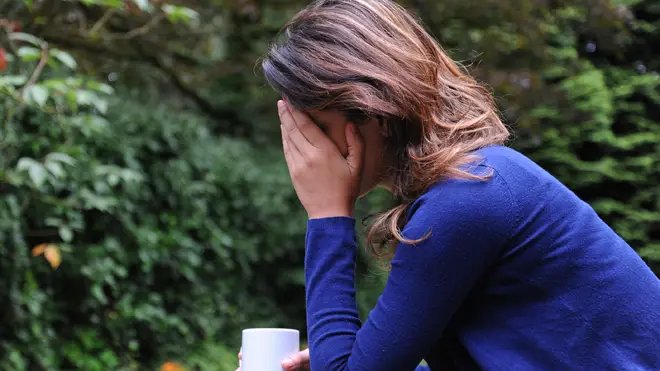
Vanessa Feltz 3pm - 6pm
6 May 2021, 08:09 | Updated: 6 May 2021, 09:50

Rates of depression have more than doubled since before the coronavirus pandemic, with young people - especially women - hit the hardest, figures suggest.
More than a fifth (21%) of people aged 16 and over in Britain experienced some form of depression between January 27 and March 7, according to the Office for National Statistics (ONS).
This is up from 10% before the pandemic, between July 2019 and March 2020.
The ONS analysed responses from 23,935 people aged 16 and over in 2021 and compared them to data collected before and during the pandemic.
READ MORE: Children 'struggling to socialise in person after months of lockdowns'
Depression rates were based on those who indicated moderate to severe depressive symptoms.
Younger adults and women were more likely to experience some form of depression, with 43% of women aged 16 to 29 and 26% of men of the same age experiencing symptoms.
Among people aged 16 to 39 the figure was 29%, up from 11%, while for those with a disability the figure was 39%, up from 27%.
Some 25% of people living in a single-person household experienced depression in early 2021, up from 15% before the pandemic.
For those living in a household with at least one child under 16, the proportion more than tripled - from 6% to 23%.
Some 28% of adults living in England's most deprived areas experienced depressive symptoms, compared with 17% in the least deprived parts.
Separate ONS figures published on Wednesday show that diagnoses of depression by GPs in England
between March 23 and August 31 last year fell by 23.7% compared with the same period in 2019.
Depression accounted for 15.6% of total diagnoses over the period - a rise of 1.3 percentage points.
Those aged 45-54 saw the largest fall in the number of diagnoses - a 30.1% decrease.
People living in the second most deprived areas saw an increase of 1.5 percentage points in depression diagnoses as a percentage of all diagnoses.
Theodore Joloza, ONS principal research officer, said: "While the number of GP-diagnosed cases of adult depression has fallen during the pandemic, these cases make up a larger percentage of overall diagnoses than pre-pandemic.
"Meanwhile self-reported feelings associated with depression continue to increase.
"The picture is one of a rising toll on mental health, with many people not necessarily accessing medical help."